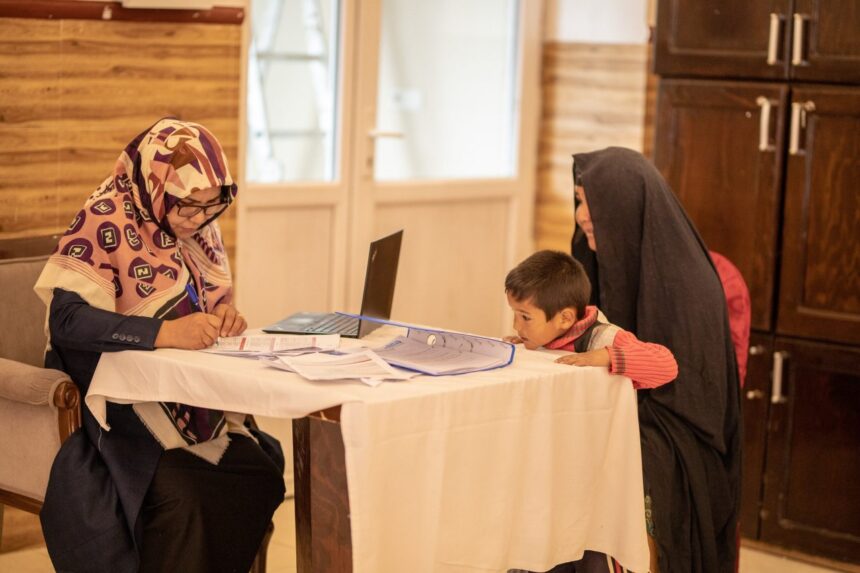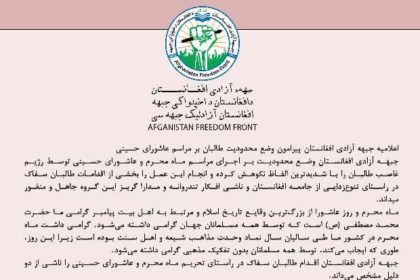RASC News Agency: In a disturbing escalation that signals a new phase of gender persecution under Taliban rule, armed operatives affiliated with the Taliban have reportedly launched a systematic campaign of intimidation, surveillance, and violent threats targeting Afghanistani women employed by United Nations agencies in Kabul.:According to multiple corroborated accounts from within the UN system, the Taliban’s repressive machinery has now extended beyond institutional restrictions into the private lives and homes of female professionals. On Tuesday and Wednesday of this week, Taliban affiliates reportedly followed several female UN staff members from their offices to their residences effectively placing them under hostile surveillance. In at least three confirmed cases, armed men knocked on the doors of these women’s homes, threatening their families at gunpoint and coercing male relatives into signing written pledges to forcibly prevent them from continuing their employment.
The intimidation appears to be directed particularly at women working for major UN bodies including UNICEF, UNAMA, the UN Development Programme, the UN Population Fund, and the World Health Organization. This pattern of targeted harassment reportedly began near the UN compound in Pul-e-Charkhi and spread across residential districts such as Karte Char, Makroriyan, Darulaman, Kote Sangi, Arzan Qimat, and Khairkhana creating a blanket of fear across Kabul’s most densely populated areas. In the wake of this escalating crisis, UN administrators have advised their Afghanistani female staff to work remotely “until further notice.” Yet this move is viewed by many as an inadequate response to what amounts to a direct assault on the UN’s operational integrity and a betrayal of the rights of its local female workforce. No formal security guarantees or statements of protection have been offered leaving employees to navigate this life-threatening environment on their own.
This unprecedented wave of personal threats marks a dangerous evolution in the Taliban’s systematic repression of women. Previously, the group relied on administrative decrees such as the 2022 edict issued by Taliban leader Hibatullah Akhundzada banning women from working with NGOs. Now, the campaign has metastasized into physical intimidation and threats of murder, transforming an already intolerable situation into a humanitarian emergency. “This is no longer about ideological restrictions; this is state-sponsored terror against women,” said a senior United Nations development officer in Kabul, speaking under the condition of anonymity. “We are being hunted. And yet, the silence from international leadership is deafening.”
The Taliban’s actions represent a flagrant violation of international law, the UN Charter, and basic human rights. But more than that, they lay bare the group’s broader goal: the total erasure of women from Afghanistani public life. Despite repeated international pledges of engagement and humanitarian cooperation, the Taliban continue to operate with impunity, enforcing what has been widely described as gender apartheid. What makes this moment particularly chilling is the calculated nature of the threat. This is not a byproduct of chaos; it is an organized campaign coordinated, targeted, and deliberate. It sends a clear message: in Taliban-controlled Afghanistan, women are neither safe in public nor behind closed doors.
As global institutions continue to debate diplomatic engagement with the Taliban, the cost of inaction grows more grotesque by the day. The world must not normalize a regime that uses fear, violence, and medieval ideology to silence its women. Immediate and uncompromising international action is not only a moral imperative it is a test of the world’s commitment to the very principles of human dignity and justice. If the international community fails to respond, the Taliban’s shadow will grow longer not only over the women of Afghanistan, but over the conscience of the world itself.






